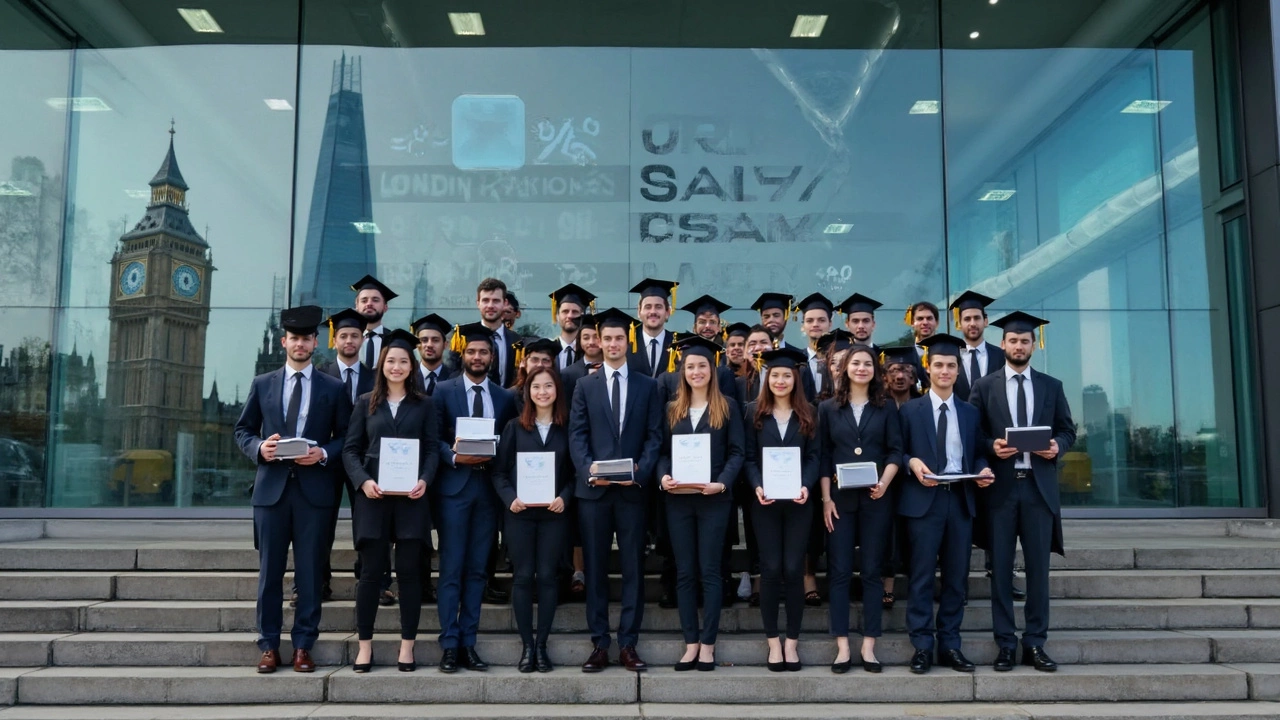Wondering if getting a master’s will pay off? The answer isn’t as simple as a single ranking chart. Some degrees can take your salary sky-high, while others don’t move the needle much. It all comes down to what you study, where you work, and the demand for your skills.
Right now, certain master’s programs are clearly outpacing the rest. Think data science, nurse anesthesia, finance, and computer engineering. These aren’t just trends—they’re solid bets based on what employers desperately need. Six-figure starting salaries are common here, and that’s before you factor in bonuses or stock options.
But not every high-paying path is obvious. Some healthcare and tech roles are climbing so fast that last year’s salary stats are already out of date. If you want numbers, examples, and realistic advice (plus some unexpected tips), you’re in the right place. Let’s lay out what really matters when chasing a degree that’s worth the money—and your time.
- Master’s Degrees That Lead the Pack
- What Companies Are Willing to Pay For
- Salary Numbers: What to Expect
- Surprising Factors That Boost Earnings
- Smart Tips Before Choosing a Program
Master’s Degrees That Lead the Pack
If you’re after the high-paying master's degrees, a few fields have emerged as real winners in 2025. Let’s break down the leaders by actual impact on paychecks—not just popularity.
STEM programs (science, technology, engineering, and math) completely dominate the list. Graduates from fields like computer science, data science, and electrical engineering walk into roles that easily break the $100K mark straight after graduation. For example, folks finishing a master’s in Artificial Intelligence or Machine Learning often get hired by tech giants with starting offers north of $120,000. Data from the National Association of Colleges and Employers shows that tech and engineering master's grads reported average offers between $100,000 and $140,000 in the last hiring season.
Another heavy hitter: nurse anesthesia. Most nurse anesthetists (CRNAs) finish with a Master of Science in Nursing (MSN) and land jobs with salaries between $170,000 and $210,000. This isn’t just talk—hospitals are scrambling to fill these high-skill roles, and they know they have to pay for them.
Finance and business analytics are also big earners. A Master of Finance or an MBA with a focus on analytics can easily put you into $100K+ jobs in banking, consulting, or fintech. Some investment banking analysts rake in $150,000 with bonuses included—right out of the gate.
If you like tables, here’s a snapshot of what the top fields look like now:
| Degree | Typical Starting Salary (USD) | Common Employers |
|---|---|---|
| MS in Computer Science/Data Science | $110,000 – $140,000 | Google, Meta, Amazon, startups |
| MS in Nurse Anesthesia (MSN) | $170,000 – $210,000 | Hospitals, surgical centers |
| Master of Finance | $95,000 – $150,000 | Investment banks, consulting firms |
| MS in Electrical Engineering | $95,000 – $130,000 | Tech companies, energy firms |
Healthcare (besides nurse anesthesia), like physician assistant studies and some pharmacy programs, can also land you above the US median salary, but they’re not quite at the same level as those powerhouse tech or finance roles. If you want the best chance at maximizing your investment, stick to one of these top master's programs where job growth is matched by serious paychecks. That’s where the money’s moving right now.
What Companies Are Willing to Pay For
If you want a real shot at landing a high-paying job after your degree, it pays to know exactly what companies are hunting for right now. The truth? It’s not just about having a diploma—it’s about having the right skills that solve their biggest headaches.
Tech companies can’t get enough of folks with a computer engineering or data science master’s. If you can program, crunch data, or make AI smarter, you’re already ahead. In the last year, the need for data scientists jumped by 36%, and jobs for AI specialists saw a similar spike. It’s not just the big names like Google or Apple either—healthcare, finance, and even retail companies are desperate to hire anyone who knows how to turn piles of data into insights that save them money or create new products.
Healthcare is another goldmine for steady, high salaries. Hospital systems and private clinics put a premium on nurse anesthetists, physician assistants, and some types of healthcare administrators. A master’s in nurse anesthesia is a ticket to jobs where offers regularly start at $195,000 a year, and the number of job postings is only going up as the population ages.
| Master’s Degree | Typical Starting Salary (2024-25) | In-Demand Industry |
|---|---|---|
| Data Science | $115,000 | Tech, Finance, Healthcare |
| Nurse Anesthesia | $195,000 | Healthcare |
| Finance/MBA | $110,000 | Finance, Consulting |
| Computer Engineering | $125,000 | Tech, Aerospace |
Finance and consulting companies are still willing to pay top dollar for sharp analysis and leadership. A master’s in finance or an MBA opens doors to big-name banks, investment firms, and consulting giants. Here, it’s about proving you know money and can lead teams—even fresh grads from top universities can snag sign-on bonuses as fat as $30,000 just for showing up.
- Technical skills (coding, statistics, engineering) are the real money magnets.
- Healthcare roles tied to patient care or complex systems see the most growth.
- Business smarts—project management or financial know-how—still have strong value in major industries.
If you’re laser-focused on a high-paying master's degree, use job boards to see what titles and skills pop up the most in your field. Seriously, this research is worth it. Matching your program’s coursework to what job ads ask for gives you a bigger bargaining chip when interview time rolls around.

Salary Numbers: What to Expect
If you’re going back to school, you want real numbers—not just guesses. Out of all high-paying master’s degrees, a few stand out year after year. Here’s what you can actually expect once you hit the job market.
For 2025, tech and healthcare are where the biggest paychecks are. If you get a Master’s in Computer Science or a similar engineering field, starting salaries usually sit between $110,000 and $140,000. Top tech companies even offer sign-on bonuses that can bump these numbers up by $10,000 to $25,000. Graduate salaries in data science, AI, and cybersecurity are right in this range, too.
If you’re after a Master of Science in Nursing (especially Nurse Anesthetist), you’re looking at $180,000 or more as a median salary. This number jumps even higher if you work overtime or switch to contract roles. It’s almost double what some other graduate programs deliver.
Finance and business analytics grads also cash in bigger than most. At top investment banks or private equity firms, it’s common to start at around $120,000—not counting bonuses, which can be huge during a good year.
| Master's Degree | Typical Starting Salary (2025) |
|---|---|
| Nurse Anesthesia (MSN) | $180,000+ |
| Computer Science/Engineering | $120,000–$140,000 |
| Data Science/AI | $115,000–$135,000 |
| Finance/Quantitative Analysis | $110,000–$145,000 |
Of course, location, company, and your past experience can nudge your pay up or down. But these numbers come straight from 2025 hiring data—not just school brochures. If your goal is to land one of the best master's programs for earning power, it pays to stick with what’s in demand right now.
Surprising Factors That Boost Earnings
It’s easy to think that your high-paying master's degree alone will set you up for a fat paycheck, but real life is a little trickier. The field you pick is crucial, sure—but there are some less obvious moves and choices that can make (or break) your earning power right after graduation.
Top companies shell out the big bucks for skills they actually need right now. For example, data from 2024 showed tech firms paying up to 25% more for grads who bring artificial intelligence or quantum computing know-how—on top of a regular computer science master's. But there’s more to it than your degree.
- Location, location, location: Major cities like San Francisco, New York, Seattle, and Boston are magnets for high salaries, especially for tech and finance roles. A software engineer in San Francisco can earn $30,000 to $70,000 more than one in a smaller city with the same master's degree.
- Work experience matters: Even a year or two of related part-time or internship experience can bump your starting offer. Don’t skip those “real-world” opportunities during your program—they often mean the difference between a good and a great first job.
- Certificates and technical skills: What you add on top of your main degree can make you stand out. Finance grads with a CFA or data analysts with certified Python or AWS skills often see far more job offers and sign-on bonuses.
- Networking and personal branding: Sometimes it’s who you know, not just what you know. Programs with strong alumni networks, career fairs, or direct employer partnerships can lead to faster, higher-paying job placements (think MBA programs at Wharton or Stanford).
To really get a sense of just how much these factors move the needle, check this out:
| Factor | Average Salary Boost |
|---|---|
| Major Tech Cities | +32% |
| Relevant Internships | +17% |
| Advanced Certifications | +12% |
| Targeted Networking | +15% |
Choosing the right program is just step one. Stack these extra factors on top, and you’ll squeeze a lot more value from your best master's programs investment. Don’t just rely on classroom success—get tactical, get connected, and keep picking up new skills. That’s where the big money is hiding.

Smart Tips Before Choosing a Program
Jumping into a high-paying master's degree just because it shows up at the top of salary lists isn’t always a smart move. Here’s how to figure out if a program is truly worth your time, effort, and money.
- Check real graduate salaries, not just what schools claim. A 2024 Georgetown report found a gap of up to $30,000 between a university’s advertised post-grad salaries and what students actually earned three years out. Use sites like Glassdoor and LinkedIn for real-world numbers and talk to recent graduates so you see the truth.
- Look at demand in your region. Some of the best-paying jobs, like nurse anesthetists and software engineers, are only in high demand in certain areas. If you’re not open to moving, make sure your state or city really needs those skills.
- Consider total cost versus payoff. High tuition doesn’t always mean high earnings. Compare the average starting salary for the program to the total cost (including living expenses) and see how long it’ll take to break even.
- Networking can be just as important as the diploma. Choose programs with strong job placement and active career support offices. In fields like analytics and finance, up to 70% of top jobs go to candidates with an insider connection, not GPA stars.
- Don’t overlook work-experience requirements. Programs like nurse anesthesia or advanced data science may expect a few years on the job before you apply. Extra work experience can boost starting salaries by $10,000 or more right from your first new paycheck.
For a quick breakdown, here’s what some of the top-earning graduate salaries look like in 2025 for fresh master’s grads in the U.S.:
| Master’s Program | Typical Starting Salary |
|---|---|
| Nurse Anesthesia | $195,000 |
| Computer Science/Data Science | $135,000 |
| Finance | $120,000 |
| Engineering (Electrical/Computer) | $125,000 |
| Business Analytics | $110,000 |
Bottom line: Don’t make snap decisions. Pick your program based on real numbers, solid job demand, and how the degree fits your personal goals. There’s no one magic answer, but a bit of research goes a long way when serious money is on the line.

